Pompeo Ridicules Biden’s Opinion About Middle East Security
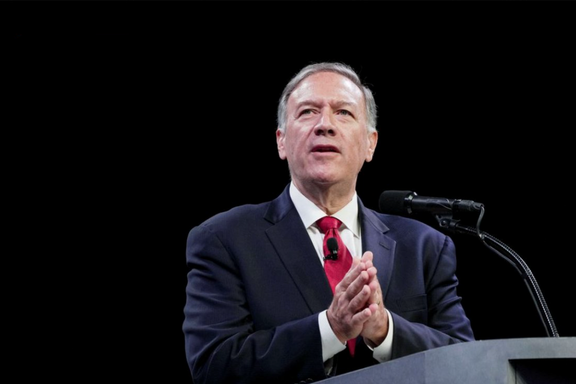
Former US Secretary of State Mike Pompeo has reacted to an opinion piece penned by President Joe Biden for the Washington Post, saying only Iran’s Supreme Leader agrees with you.

Former US Secretary of State Mike Pompeo has reacted to an opinion piece penned by President Joe Biden for the Washington Post, saying only Iran’s Supreme Leader agrees with you.
In a tweet on Sunday, Pompeo rejected Biden’s claim that the Middle East is “more stable and secure” now than during the presidency of Donald Trump.
“You've got to be kidding me,” he said, adding that former chief of the United States Central Command (CENTCOM) General Kenneth F. McKenzie or any Israeli, Emirati, Afghan or Saudi citizen can testify that Biden is wrong.
Both former and current CENTCOM commanders called Iran the most destabilizing force in the Middle East.
“Only the Ayatollah agrees,” Pompeo said, referring to Ali Khamenei who usually tries to portray the region as more stable and tranquil than it truly is.
The US President said that when he took office Washington was “isolated and alone” at the United Nations Security Councill on the issue of Iran, as his predecessor had withdrawn from the 2015 nuclear agreement known as the JCPOA.
But the president also made a series of claims not exactly reflecting reality.
While there is more Western diplomatic coordination in dealings with Iran, the country has almost reached a nuclear threshold stage during Biden’s presidency and is violating more US oil export sanctions. Iran has now sufficient enriched uranium for one nuclear bomb.
Moreover, Biden’s claims about more stability in the Middle East also leave room for questions, as the US troops have been targeted at least 29 times since October 2021 without any military response, on the backdrop of dozens of Iran-backed Houthi attacks against Saudi Arabia in 2021 and 2022, with the aggression expanding to the UAE. Iran also continues its terror activities in the region, as recent events in Turkey showed and pro-Iran groups such as the Hezbollah and Hamas maintain a highly aggressive posture toward Israel.
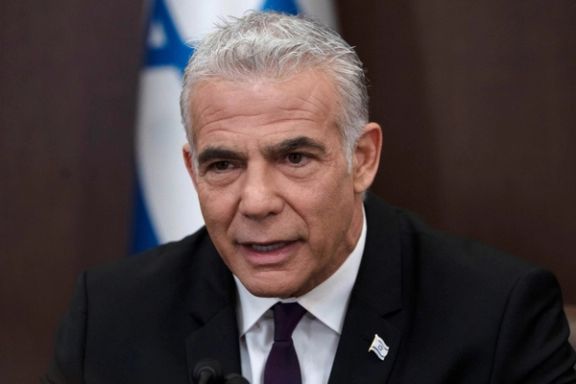
Israeli Prime Minister Yair Lapid said on Sunday that Iran’s nuclear case should return to the UN Security Council and sanctions mechanisms should be activated at full force.
At a weekly Cabinet meeting, Lapid said, “Yesterday, it was revealed that Iran is enriching uranium in advanced centrifuges in complete contravention of the agreements it has signed. The international response needs to be decisive.”
He also reiterated that “Israel reserves political and military freedom of action in fighting the Iranian nuclear program.”
Appealing to Middle Eastern Sunni Muslim countries to engage in steps of rapprochement with Israel, he said, "Israel extends a hand to the countries of the region and calls to change history for the sake of our children.”
About President Joe Biden’s upcoming visit to Jerusalem, slated for Wednesday, Lapid said it “will focus first and foremost on the issue of Iran.” “Israel will not stand idly by while Iran tries to attack us. Our security services know how to reach anyone, anywhere -- and they will do just that. We will discuss with the president and his team expanding security cooperation against all threats.”
Biden’s tour to the Middle East also includes a stop in Saudi Arabia, which is reportedly considering a joint three-way meeting with the United States and Israel either during or after Biden's visit.
The White House’s National Security Council spokesman John Kirby said on Thursday “greater collaboration” on issues such as air defense, particularly with regards to countering Tehran, would be also on Biden’s agenda.
The US and Israel are seeking to lay the groundwork for a security alliance with Arab states that would use Israeli technology to connect their air defense systems to combat Iranian drone and missile threats.
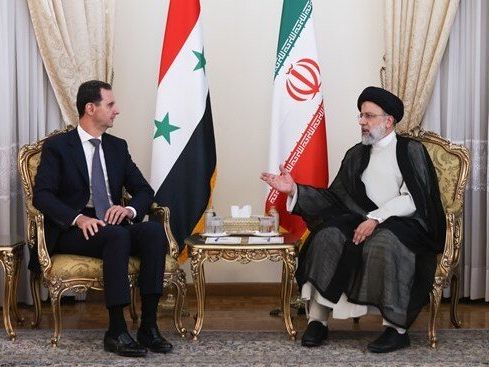
Iranian President Ebrahim Raisi has reassured his Syrian counterpart that the Islamic Republic will continue its support for the ‘Resistance Front’, especially Syria.
In a phone call with Bashar al-Assad on Saturday evening on the occasion of Eid al-Adha, Raisi reiterated Tehran’s support for “the axis of resistance.” The terms "resistance front" or “axis of resistance” are coined by the Islamic Republic to describe its allies and proxies throughout the region.
Raisi also said that Tehran supports the establishment of peace and stability in Syria and opposes any foreign intervention in the country.
According to Iranian media’s readout of the phone call, Assad said that "the enemies are getting weaker day by day against the axis of resistance,” noting that Iran and Syria are on the same front.
In recent years, Iran bought large tracts of land close to the Syrian Israeli border and is settling Shiites to threaten Israel, taking advantage of a destructive civil war in Syria and the ensuing poverty, as well as migrations.
Many young people in these areas, very close to Israel, are now members of Iranian-backed militia groups, such as Hezbollah or the Afghan Fatemiyoun Brigade.
These forces have been fighting under the Revolutionary Guard’s command for almost a decade in Syria to keep Assad in power, and when the war turned against rebels, the Iranian military moved closer to the Israeli border.
Some countries in the region, notably Jordan, are concerned about Iran and its proxies filling a vacuum left by Russians in southern Syria.
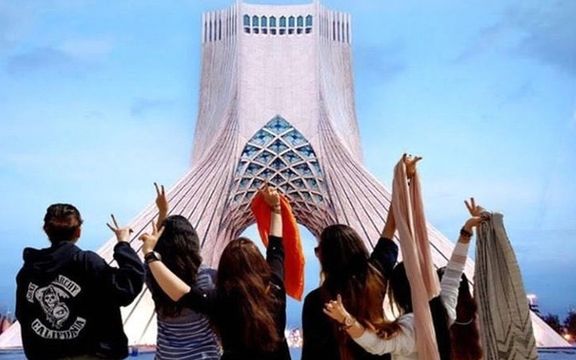
Authorities in Iran are harshly cracking down on ‘bad-hijab women’ and will hold a ‘hijab rally’ on Tuesday, but women activists have their own plans to protest.
President Ebrahim Raisi on Wednesday called lack of compliance with hijab rules “an organized promotion of [moral] corruption in Islamic society” and ordered all government entities to strictly implement a “chastity and hijab” law drawn in 2005 by the Supreme Council of the Cultural Revolution.
Authorities have also launched an extensive campaign this year against women they call ‘bad-hijab’. In addition to crackdowns by the ‘morality police’ on the streets, some officials have ordered extra measures, including to government offices, banks, and public transportation authorities to withhold service to ‘bad-hijab’ women.
In the past few weeks authorities have also shut down some businesses such as cafes and restaurants and detained their female patrons for ‘improper hijab’ and arrested nature tourists for flouting their hijab, dancing, and drinking in the depths of northern forests.
In the jargon of religious and political hardliners women who are unwilling to wear the hijab and display their displeasure by wearing small and colorful headscarves with tight-fitting, short dresses are called ‘bad-hijab’ ones.
Meanwhile, authorities this year named the 12th of July as Hijab and Chastity Day and are planning rallies at stadiums and other places to honor, celebrate, and promote the Islamic notion of the hijab (cover) for women.
But women’s rights activists say forcing women to follow a certain dress code is a violation of their human rights. In response to the government’s plans, they have called on women to action against compulsory hijab on July 12, to drop their headscarves in the streets and other public places. The campaign has been dubbed as the ‘NO2Hijab’ campaign.

Activists are also urging men to support the women’s movement by accompanying their wives and daughters on the street when they protest or by posting videos on social media.
Mehdi Hajati, a political activist, in a tweet Tuesday supported the ‘No2Hijab’ movement. The movement is driven by those who are demeaned by the hijab rules and will succeed if protests continue. “Those [who try to enforce hijab rules] will eventually be exhausted [by our protests],” he wrote. Hajati, a former member of Shiraz City Council was expelled from the council in 2018 and was arrested for speaking out against the arrests of two members of the persecuted Baha’i minority.
The anti-hijab social media campaign has once again been spearheaded by US-based activist Masih Alinejad who has been behind several social media campaigns against compulsory hijab over the past decade.
“Many of us remember this fear when we got arrested for the first time by morality police. No other government in the world— not even North Korea—terrorizes women because their hair is showing. The Islamic Republic of Iran is a gender apartheid state,” Alinejad tweeted Friday with a photo of two women in a ‘morality police’ van crying out in horror.
In 2012 Alinejad launched the “Stealthy Freedoms” campaign, which invited women to share photographs of themselves without the hijab. She continued her campaign with “White Wednesdays” in 2017 which encouraged women to wear white headscarves or take them off in protest at the rules every Wednesday. Both campaigns became quite popular on social media.
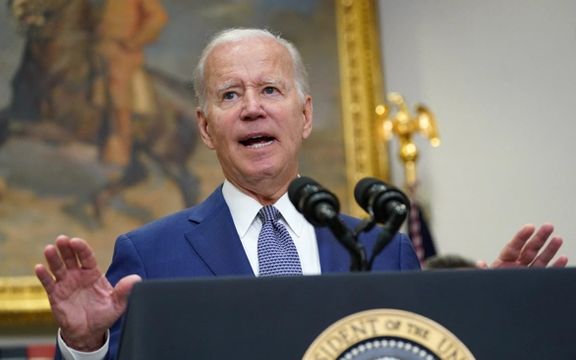
Iran has been diplomatically isolated during his 18 months in office, President Joe Biden argued in an opinion piece published Saturday by The Washington Post.
Biden also wrote that the Middle East is “more stable and secure” now than during the presidency of Donald Trump.
Prior to his trip to the region Biden tried to defend his diplomatic record and efforts of military deterrence, arguing that attacks against US targets have decreased and a ceasefire has been declared in Yemen.
The President said that when he took office the United States was isolated on the issue of Iran, as his predecessor had withdrawn from the 2015 nuclear agreement known as the JCPOA, which “was working” and found itself “isolated and alone” at the United Nations Security Council.
“With respect to Iran, we reunited with allies and partners in Europe and around the world to reverse our isolation; now it is Iran that is isolated until it returns to the nuclear deal my predecessor abandoned with no plan for what might replace it,” he said.
Biden also took credit for a vote at the International Atomic Energy Agency’s Board of Governors on June 8, when “30 countries joined us to condemn Iran’s lack of cooperation,” he said and added, “My administration will continue to increase diplomatic and economic pressure until Iran is ready to return to compliance with the 2015 nuclear deal, as I remain prepared to do so.”
But the president also made a series of claims not exactly reflecting reality.
While there is more Western diplomatic coordination in dealings with Iran, but that country has almost reached a nuclear threshold stage during Biden’s presidency and is violating more US oil export sanctions. Iran has now sufficient enriched uranium for one nuclear bomb.
Biden said that after Trump’s withdrawal from the JCPOA, “Iran had passed a law mandating the rapid acceleration of its nuclear program.”
He was referring to a law tabled in the Iranian parliament on November 4, 2020, to elevate uranium enrichment to 20 percent, the day after the US election, and 17 months after Trump abandoned the deal.
The Iranian escalation came after candidate Biden published an opinion piece on CNN in September 2020 saying Trump’s decision was a big mistake and he would retore the JCPOA. It seemed that Iranians seeing Biden willing to negotiate escalated their nuclear program.
The escalation continued in early 2021 with uranium enrichment reaching 60-percent purity, as the Biden Administration began negotiations with Tehran.
Before Biden’s election, Tehran had retaliated against Trump by a small increase in the level of enrichment, but nowhere close to accumulating highly enriched fissile material for a bomb, as is the case now.
The President also made claims about more stability in the Middle East which leave room for questions.
He said that attacks against US targets substantially decreased after he ordered retaliation for Iran-backed rocket strikes. But US troops have been targeted at least 29 times since October 2021 without any military response, a critic said.
He also did not mention dozens of Iran-backed Houthi missile and drone attacks against Saudi Arabia in 2021 and 2022, with the aggression expanding to the United Arab Emirates earlier this year.
Iran also continues its terror activities in the region, as recent events in Turkey showed and pro-Iran groups such as the Hezbollah and Hamas maintain a highly aggressive posture toward Israel.

Iran’s homegrown Covid vaccine factories are shutting down for lack of demand as many vaccinated with foreign vaccines refuse to get homegrown ones as boosters.
The whole scheme of producing domestic vaccines now seems little more than wasting hundreds of millions of dollars and precious time in preventing tens of thousands of deaths in 2021.
According to the latest official figures, nearly 65 million Iranians have had one dose, 58 million two doses but only 27 million have had a third shot of the vaccine. Of the total of 150 million doses administered so far, the Chinese Cinopharm accounts for over 80 percent and AstraZeneca for around 10 percent. Vaccine imports stopped a few months ago and the only vaccines available for a booster now are homegrown variants.
Only a total of 20 million (13%) used in the vaccination program so far were produced by the seven Iranian developers that received support and funding from the government. None of Iran’s seven homegrown vaccines has received the approval of the World Health Organization.
Some Iranian physicians believe many Iranians are refusing to get a third shot because they were inoculated with foreign-made vaccines before but will now have to get homegrown ones with doubtful efficacy against new Covid variants.
Lack of demand has led to homegrown Covid vaccine production lines shutting down one after the other and millions of doses are near expiration in storage.
All domestic developers, including the Barekat Foundation and Razi Institute, for instance, hav millions of doses of unsold vaccines which will soon expire. Developers will go bankrupt, they say, if the government does not purchase their products but the government already has 50 million doses in storage and no cash to even pay the rest of its debts, around $250 million, for the 50 million doses of homegrown vaccines it purchased before.
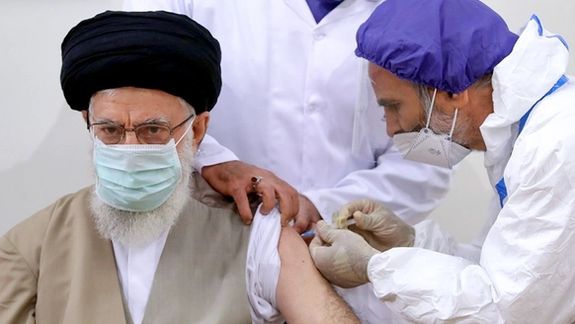
Some of the vaccine producers, including the state-owned Barekat Foundation, received hundreds of millions of dollars to start their vaccine development program from scratch despite having had no experience in the field.
Mohammad Mokhber, the head of the Barekat Foundation who is now vice president in President Ebrahim Raisi’s administration, repeatedly promised that the foundation would be delivering fifty million doses of its product, CoVIran-Barekat, before August 2021 to be used in the vaccination program. These promises never materialized.
Iran's national vaccination plan did not make any significant progress before presidency was handed over to Raisi in August last year. Raisi has repeatedly boasted about the success of his government in mass vaccination and Covid management.
But critics say centers of power controlled by hardliners impeded fromer President Hassan Rouhani’s vaccine purchases and once he was gone, allowed vaccines already ordered to flow into carry out the vaccination plans and take credit for it.
This resulted in a new wave of infection in the summer of 2021 to kill around 40,000 unvaccinated citizens.
The Rouhani government had ordered 16.5 million doses of these vaccines, the only ones approved by World Health Organization (WHO) at the time, through WHO’s Covax program, but Khamenei banned the purchase of American and British Covid vaccines in early January 2021 putting forth a conspiracy theory that the two counties could not be trusted.
Some hardliners including a top IRGC official even claimed that there was evidence that foreign companies producing Covid-19 vaccines wanted to reduce the world population by 20 percent or that their vaccines were meant to use as biological weapons against Iranians.